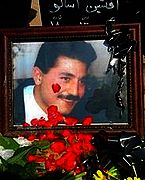Afshin Osanlu Buried, His Family Summoned
Afshin Osanlu’s memorial service was held in Tehran while a number of his family members were summoned to security organizations, and security officers filmed the participants in his memorial service. Meanwhile, his family’s request to hold the service at the Aljavad Mosque in Tehran was denied.
Afshin Osanlu was transferred to a hospital on June 20 after suffering a heart attack at the Rajaeishahr Prison, and passed away on the morning of Friday, June 21. The 42-year old labor activist was arrested in fall of 2010 and sentenced to five years imprisonment on charges of “conspiracy and illegal assembly.”
Prior to his memorial service, several members of his family were summoned to security organizations and warned against any controversy or political statements at his service.
One member of Osanlu’s family told Rooz that security officers present at Osanlu’s memorial interrogated some of the participants and inspected their belongings.
In addition to members of his family, several labor activists, members of unions and political activists also attended Osanlu’s memorial.
Meanwhile, 44 political prisoners published an open letter blaming “the judiciary and prison system’s inattention and incompetence” for Afshin Osanlu’s death, writing, “The judiciary and the prison system are responsible for the deaths of Hoda Saaber and Afshin Osanlu and any similar event.”
Osanlu was subjected to torture and pressure during his arrest, such that in winter of 2011 he underwent surgery at a hospital for “injuries resulting from torture.”
Journalist and former political prisoner Sam Mahmoudi Saraei, who had shared a prison cell for some time with Afshin Osanlu, told Rooz, “Afshin was not a prison or room or cell type of person. He was a man of the road. The prison conditions had deeply depressed him. He believed that the reason for his conviction was the regime’s attempt to take revenge from his brother, Mansour Osanlu, and this issue, and the fact that, as a union activist, he was paying the price for another person’s activities, increased the weight of the pressure on him.”
This political prisoner describes Osanlu’s physical condition in prison: “Afshin suffered from heart problems. His brother suffered from heart problems too. In fact, this wasn’t a particular problem of Afshin’s. If you look at the statistics, you will notice that more than 75 percent of prisoners suffer from heart problems. This is because of the interrogations and heavy pressures of prison.”
Mahmoudi Saraei continues, “Afshin had a large wound on his left shoulder, which had formed because of the beating he endured during interrogation. Various bones in Afshin’s face and head area were broken during interrogation and he had even lost several teeth in interrogation. He was heavily tortured in a Sanandaj jail. He used to tell me that they would strap him to a ‘miracle bed’ to heavily beat him with cables. The soles of his feet were destroyed because of the beatings. Then they would force him to walk on his feet. Because of all these problems, he suffered from health issues and could hardly walk. But because of his pride, he didn’t talk about it and few people knew that he couldn’t walk because of these problems.”
Sam Mahmoudi Saraei though points out another thing: “Although prison officials have drawn some prisoners into the trap of addiction to methadone to keep them calm, Afshin never fell into the regime’s trap and always tried to motivate people who had, so that they could resist or stage a strike.”

